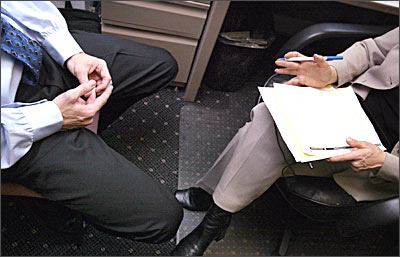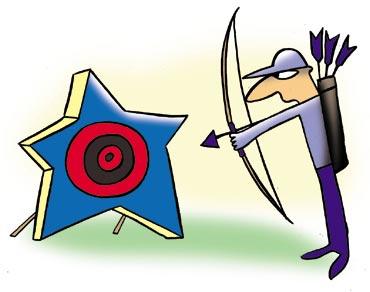 | « Back to article | Print this article |
Writing CVs: 10 tips to IMPRESS recruiters
With placement season round the corner, Jayprakash J, Assistant professor of English, Faculty of Engineering and Technology, SRM University, Chennai tells fresh graduates what they must include in their CVs!
Come October and campuses across the country begin gearing up for the placement season.
Aspiring graduates are busy preparing resumes and discussing career options.
After spending a lot of time assessing yourself and determining suitable career options, it is time now to take the first step in your job-search -- to prepare a good resume. This is important because it's the one thing employers assess you by.
Corporate firms are very much interested in hiring the best candidates. However, it is very important for employers to shortlist the best candidates among hundreds of applicants for a particular position.
They don't wish to spend a lot of time interviewing each candidate or talking to them over the phone to find out whether the candidate has the required skills for the job.
Yet, resumes can be used to screen candidates on the basis of their education and skills. Employers spend less than 20 seconds on an average, scanning resumes for an advertised post.
At this preliminary stage, they use the resume more as a basis for weeding out unsuitable candidates rather than choosing suitable candidates.
How effectively you present yourself will determine whether you make that first cut or not. It is the first step in your long professional journey, the first tool in the job search, and unless it excites curiosity, inspires confidence and informs the prospective employer of your suitability, you will not be able to go much further.
Your resume must speak to the employer for you, it must accurately mirror your true potentials and interests.
Without being excessively boastful, it must highlight your achievements and your strengths, making a favourable first impression.
Please click NEXT to continue reading...What to put into a resume and what to leave out?
Before we see some of the important details to be furnished in a resume, let's look at the chief characteristics of a resume.
It should be:
- Clear
- Complete
- Concise
A resume tries to present as clearly, completely and concisely as possible, that part of your background that relates to your career objectives.
This means that you possibly put in everything you have done and achieved.
You have to be selective. From your self-analysis, pick those qualities and achievements that relate directly to the job you are applying for.
A completed resume should be positive and honest. It should communicate your profile in a manner that impresses and interests the prospective employer.
When your resume reaches the desk of a recruiter, it is already in competition with others.
Remember that many entry-level candidates like your classmates would have similar educational and professional backgrounds. So focus on what makes you different, or more suitable.
Illustration: Uttam Ghosh
Name, address, telephone and e-mail address
This comes right at the top of your resume and provides your identification.
Every employer wants to know who you are and where s/he can get in touch with you.
Spell your full name correctly and give your complete mailing address.
If you are providing a number other than your own, or one at which you are not always available, make sure you mention that the number is to be used for messages only.
Include your e-mail address; it allows employers to get in touch with you quickly.
While creating e-mail accounts, make sure that your address doesn't contain an underscore ( _ ). If it contains, be sure that it is visible, it should not merge with the line that you make to highlight your address.
Career objective
The career objective is a concise statement (one sentence) indicating the type of job you are looking for and your long term goals.
Do not include this if you are not clear about it. Stating a career objective is usually effective for entry level candidates.
You must show the employer through your resume objective that you are ready to learn new things and technologies and put them into practice as soon as possible so that you can provide profitable results to your employer.
Give the employer an assurance that you will work very hard for the company's development as well as your own career growth.
Always keep it in mind to clearly specify what your future objectives are in the resume objective section. This will help the employers to understand which profile exactly suits you. Do not write a long objective.
Always use positive words which shows how skillful, committed, educated, important, hardworking and eligible you are to the organisation.
Some suggestions of career objectives for technical graduates would be:
- To obtain a position as a software programme designer in a challenging environment that utilises teamwork for researching, learning and developing new high-tech products.
- To obtain a position that will enable me to use my strong organisational skills, educational background and ability to work well with people.
- To seek a challenging assignment and responsibility with an opportunity for growth and career advancement.
- To succeed in an environment of growth and excellence and earn a job which provides me job satisfaction and self development and help me achieve personal as well as organisational goals.
- To be involved in a work where I can utilise skills and creativity involved with system that effectively contributes to the growth of the organisation.
- To work in pragmatic way in an organisation where I can show my talent and enhance my skills to meet company goals and objective with full integrity and zest.
- To achieve high career growth through a continuous learning process and keep myself dynamic, visionary and competitive with the changing scenario of the world.
- To obtain a position of responsibilities that utilises my skills and experience and keen to work in an environment where I can enrich my knowledge.
- To enhance my working capacities, professional skills, business efficiencies and to serve my organisation in the best possible way with sheer determination and commitment.
- To work in tandem with a team in a challenging and competitive environment where I could enhance my knowledge, capabilities and put them to use for the development of the organisation
- I would like to be a part of an organisation where I could use and enhance my knowledge and talent for the development of both the organisation and myself.
- A challenging position that will utilise my extensive technical skills and will lead me to innovative work environment.
- Looking for a challenging role so that I can use my capabilities through sincerity, dedication and hard work and to move up the graph of the organisation.
- Seeking a challenging and progressive career using my inner strengths, professional, skills and creative thinking to gain future exposure, strengths and experiences.
- A position that will harness strong problem solving, analytical, interpersonal and networking skills and allow working with a high performance team working on cutting edge of technology.
- Seeking a position to utilise my skills and abilities in the software industry that offers professional growth while being resourceful, innovative and flexible.
Under educational qualifications, summarise your education in point form, including high school and all colleges and universities you have attended.
Each point should include degree or diploma awarded, year of passing, institution's name and location, and area of specialisation.
If you have a good academic record, you should mention your grades or any distinctions you have earned.
For example: 2008, BTech. (Computer Science), Pondicherry Engineering College, Pondicherry University, 7.86 CGPA
2004, Higher Secondary, VOC Govt. Higher Secondary School, Tamil Nadu State Board, 90 per cent
Illustration: Dominic Xavier
Work experience
This section helps the employer decide whether you have the necessary experience for the job.
Besides your education, your part-time or summer internships or in-plant trainings and projects help a prospective employer decide your suitability for the position.
Therefore, list out all the minor and major projects both funded and non-funded projects that you have done.
You should include the date, name and location of the employer, and a brief mention of the kind of work done.
Illustration: Uttam Ghosh
Awards and honours or achievements
Entry level candidates without much work experience should show evidence of other achievements such as awards and honours given for academic or extracurricular achievements.
If you have not made any significant achievements academically, you may also mention your participation in symposiums, workshops, seminars, and sport and cultural events.
Illustration: Uttam Ghosh
Additional skills/computer skills
List some of the additional skills that you have acquired related to your field of study such as CATIA, CAD, CAM, JAVA, VISUAL BASICS etc.
If you have done a diploma programme and obtained a certification in any of the programming languages or software packages in any institution, name of the course, name of the institution and year may be mentioned.
Illustration: Uttam Ghosh
Professional memberships
Your membership in various professional bodies could be fruitful to your career.
If you are a technical graduates, mention your membership with organisations like the International Society for Technology in Education (ISTE), the Institute of Electrical and Electronics Engineers (IEEE) or the Society of Automotive Engineers (SAE) in the CV.
Community services
A varied and significant experience in helping the community, such as organising a food drive for cyclone victims, raising fund for tsunami victims etc, if it is worthwhile, deserves mention.
Illustration: Dominic Xavier
Personal information
Information on hobbies, extracurricular interests, personality traits, gender, marital status, willingness to relocate etc helps the employer understand you better.
Illustration: Dominic Xavier
References
Entry level candidates should, in general, include the names of no more than two references.
Name as references only people who know you well enough to speak with authority about your skills and aptitudes and your personality.
Choose from among professors with whom you have interacted closely, internship or in plant training supervisors.
Always check with the person before you list him/her as a reference, so that they know prospective employers are likely to call them.
When listing references, include the full name of the person, with the honorific or title (D., Professor, Mr. etc.) job title, or position, work addresses, telephone numbers and e-mail addresses.
Illustration: Dominic Xavier










